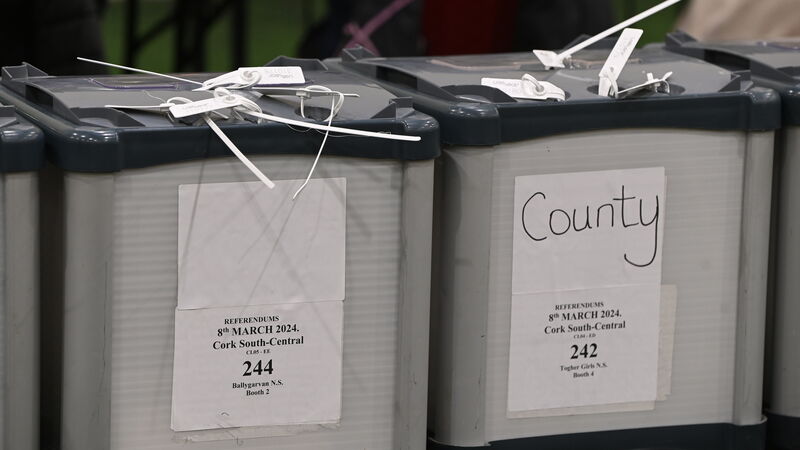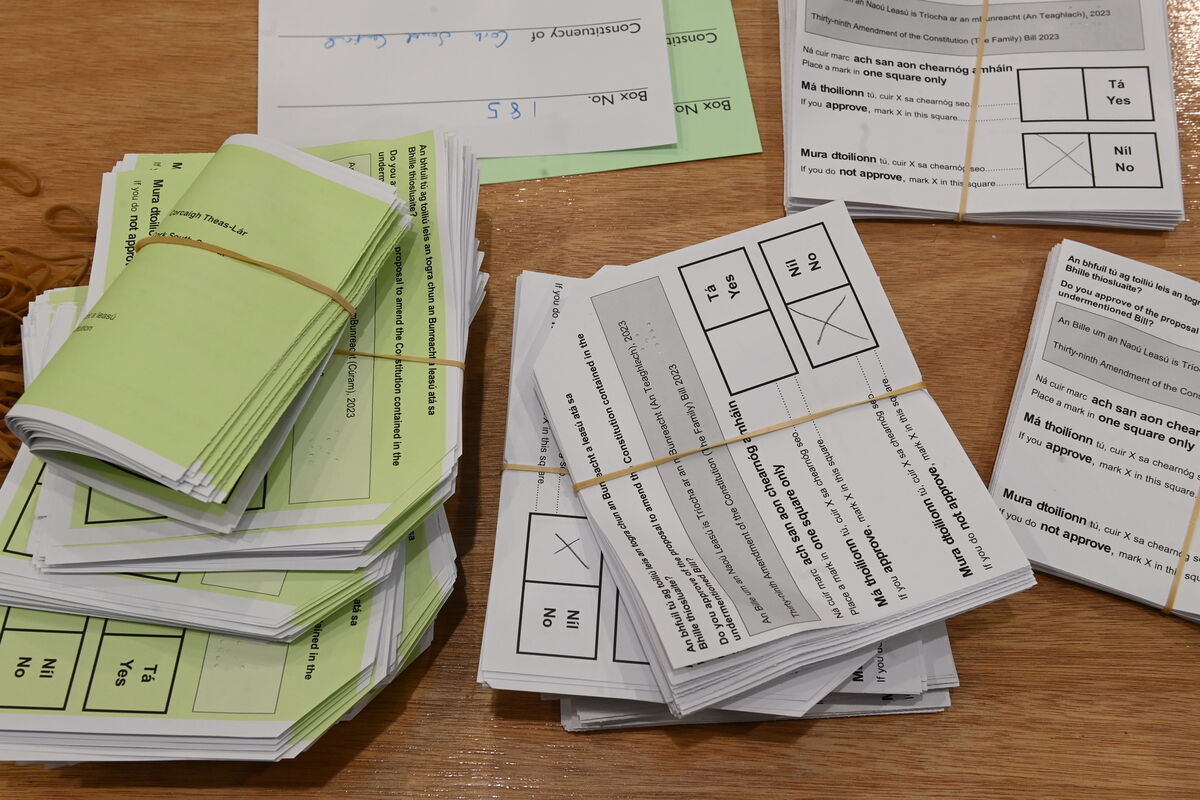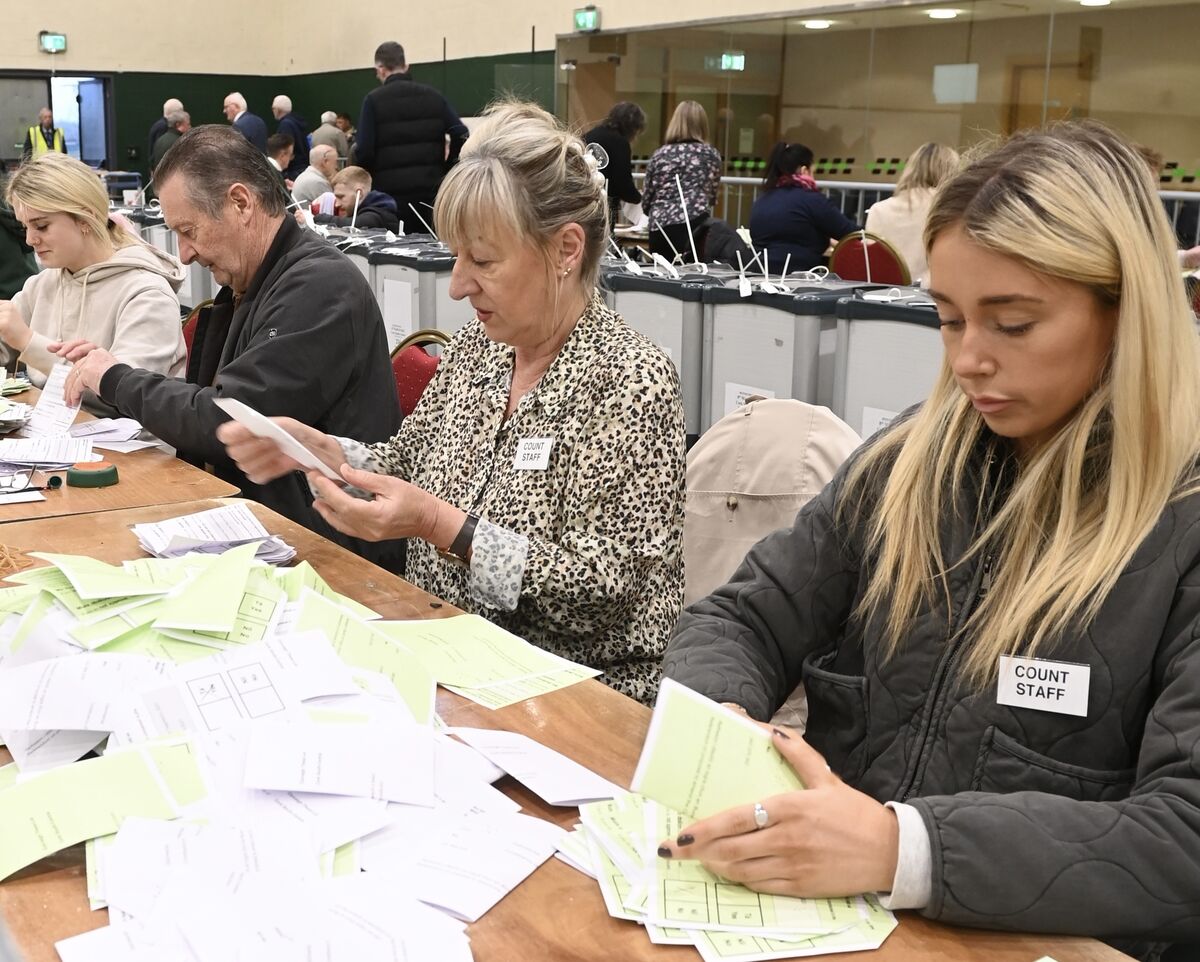'The Government didn’t understand the people': Public representatives in Cork respond to referendum counts

Ballot boxes at Nemo Rangers this morning. Counting has been taking place at the club and at Mallow GAA today. Pic Larry Cummins
As the votes are counted and a ‘No-No’ result becomes increasingly more certain in both Friday’s Family and Care referendums, the analysis has already commenced of what was being described as a bad day for mainstream political parties in Government and on the opposition benches who had advocated for ‘Yes/Yes’.
Tánaiste Micheál Martin said this afternoon that the result of the referendums on family and care "is clear".
"The majority were not persuaded by the arguments for changing the Constitution in this way.
"It is a core strength of our Constitution that the people have the final say.
"We fully respect their decision."
Mr Martin said there is no single reason why these proposals were rejected "and, like all who supported them, we will reflect on this over time."
After today, 13 different proposals have been rejected in referendums.
"While the constitutional change was rejected, it is clear that the need for continued action to support families and to respect principles of equality was not challenged. Action on this will remain an important part of our work as we complete our mandate," he added.
Independent councillor, Ben Dalton O’Sullivan, spent a good part of the morning in the Nemo Rangers clubhouse where the votes of the city constituencies were being counted and conducted a rough tally which showed a very clear picture indeed of how the voters felt in both Cork North Central and South Central.
The Carrigaline Municipal District councillor’s tally indicated that voters were voting up to 92% against the proposals in boxes in Cork South Central.
“The highest ‘No’ vote I saw was in Matehy in Cloghroe, near Blarney – you could count on two hands the number of ‘Yes’ votes while the No vote was 90, maybe 92%,” he said.
According to Cllr O’Sullivan the 'No' vote cut across demographics and the urban-rural divide with large majorities of voters in all boxes putting their ‘x’ opposite ‘No’.
“In Carrigaline it was around 75% ‘No’ while in Ballygarvan box number 2, it was also 75% 'No'.
“In Ballinora box number 3, there was an 80% 'No' vote while the number box from Togher Girls National School, covering Spur Hill and Kilmurriheen, the vote was 80% ‘No’.”
Possibly the lowest ‘No’ preference was in Monkstown where the councillor estimated it was between 55-60% voting against the proposed amendments.
“If they’re voting ‘No’ in Ballintemple and Rochestown, you can take it they’re voting ‘No’ in Ballinhassig.”
While Cllr O’Sullivan acknowledged that his tally was far from comprehensive or as detailed as it would be at an election count, there was no official tally carried out in Cork count centres that this newspaper is aware of.
The first results from the Cork South Central constituency this afternoon showed there were 24,628 'No' votes and 15,504 'Yes' votes on the family referendum.
Cllr Ben Dalton O'Sullivan's verdict on the outcome of the polls tallied with that of other politicians.
“There’s talk of that people didn’t understand it and, yes, there was a lack of information to some extent but the Government didn’t understand the people, the Government weren’t with the people on this one," Cllr Dalton O'Sullivan said.

According to Green Party councillor, Oliver Moran, he found it incredible that what he termed the ‘outdated references’ to a ‘woman’s life in the home’ and that women who work outside the home do so, potentially, to ‘the neglect of their duties in the home’ would now stay in the Constitution.
“It's difficult to believe that's really the view of the majority of Irish voters, who only a few years ago voted to expand marriage equality and access to abortion,” he said.
"I think the outcome reflects a need never to assume that progressive change is a given. There is a very strong reflexive response to progressive politics.
“Not only in Ireland but as an international phenomenon.”
“Where there is a communications gap, or lacklustre campaign, that phenomenon is allowed a hand.”
Labour Party candidate Laura Harmon, a veteran campaigner from both the Marriage Equality and Right to Choose referendums as well as the Seanad and Divorce polls, said that the wording of the Care referendum amendment, in particular, had divided people on the same side.

“This is a failure for the Government, I don’t think they communicated it properly and, from speaking to people on the doors, people were very frustrated that they didn’t get enough information,” she said, adding that she respected the outcomes of both votes.
Cllr Gearóid Murphy, a Fianna Fáil councillor in Mallow, had advocated for a ‘Yes/Yes’ vote in letters to the papers and on social media but acknowledged that the closeness to the local elections in June might have put some councillors off expressing a strong opinion either way.
“The optimal position for a councillor, not knowing how the votes would go, was to say nothing.
“I didn’t get into politics to not want to change things and get involved.”
One Cork representative who was happy with the result was Independent Ireland TD and leader Michael Collins.
While the party did not appear to have an extensive on the ground campaign on the referendums, it did advocate for a ‘No/No’ vote.
Deputy Collins said that the ‘not so silent majority’ had spoken.
“The people have spoken, and they have had enough, he said.
“Let's show them what politics should be all about.”
While the main parties of Government and the Opposition will be keen to learn lessons from this setback, the wind will be in the sails of the smaller opposition parties and independents who were minded to vote ‘No’ as the European and Local Elections approach this June.
People Before Profit-Solidarity TD Mick Barry said that the Government "made a complete mess" of these referendums.
"I want to see clear improvements in the lot of lone parents, carers and people with disabilities and I want to see sexist language removed from the Constitution.
"If the Government had put forward amendments that guaranteed such changes I believe they would have won support for change.
"But they made a dog's dinner of the wordings, alienated carers and disabled people and didn't even campaign for their proposals. I'm not surprised at the results I have to say."







 App?
App?


